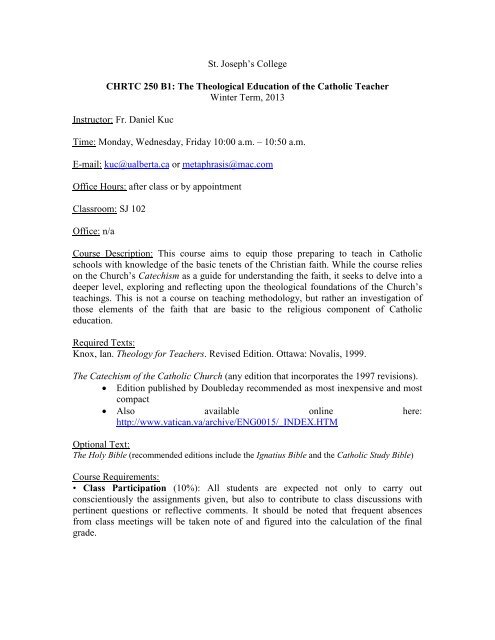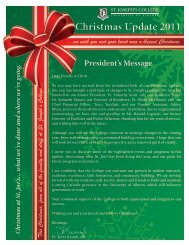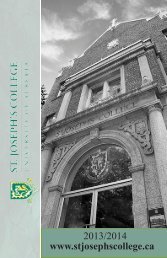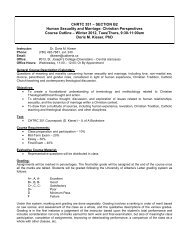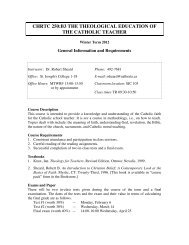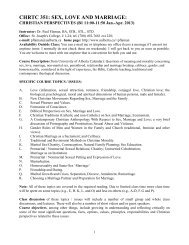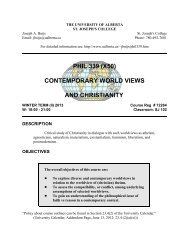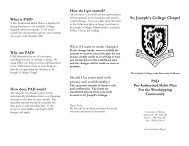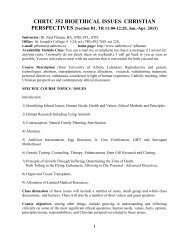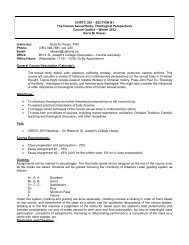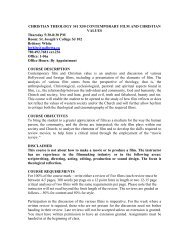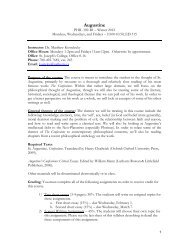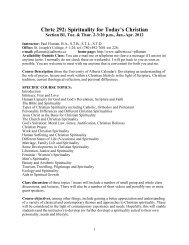St. Joseph's College CHRTC 250 B1: The Theological Education of ...
St. Joseph's College CHRTC 250 B1: The Theological Education of ...
St. Joseph's College CHRTC 250 B1: The Theological Education of ...
Create successful ePaper yourself
Turn your PDF publications into a flip-book with our unique Google optimized e-Paper software.
<strong>St</strong>. Joseph’s <strong>College</strong><br />
<strong>CHRTC</strong> <strong>250</strong> <strong>B1</strong>: <strong>The</strong> <strong>The</strong>ological <strong>Education</strong> <strong>of</strong> the Catholic Teacher<br />
Winter Term, 2013<br />
Instructor: Fr. Daniel Kuc<br />
Time: Monday, Wednesday, Friday 10:00 a.m. – 10:50 a.m.<br />
E-mail: kuc@ualberta.ca or metaphrasis@mac.com<br />
Office Hours: after class or by appointment<br />
Classroom: SJ 102<br />
Office: n/a<br />
Course Description: This course aims to equip those preparing to teach in Catholic<br />
schools with knowledge <strong>of</strong> the basic tenets <strong>of</strong> the Christian faith. While the course relies<br />
on the Church’s Catechism as a guide for understanding the faith, it seeks to delve into a<br />
deeper level, exploring and reflecting upon the theological foundations <strong>of</strong> the Church’s<br />
teachings. This is not a course on teaching methodology, but rather an investigation <strong>of</strong><br />
those elements <strong>of</strong> the faith that are basic to the religious component <strong>of</strong> Catholic<br />
education.<br />
Required Texts:<br />
Knox, Ian. <strong>The</strong>ology for Teachers. Revised Edition. Ottawa: Novalis, 1999.<br />
<strong>The</strong> Catechism <strong>of</strong> the Catholic Church (any edition that incorporates the 1997 revisions).<br />
• Edition published by Doubleday recommended as most inexpensive and most<br />
compact<br />
• Also available online here:<br />
http://www.vatican.va/archive/ENG0015/_INDEX.HTM<br />
Optional Text:<br />
<strong>The</strong> Holy Bible (recommended editions include the Ignatius Bible and the Catholic <strong>St</strong>udy Bible)<br />
Course Requirements:<br />
• Class Participation (10%): All students are expected not only to carry out<br />
conscientiously the assignments given, but also to contribute to class discussions with<br />
pertinent questions or reflective comments. It should be noted that frequent absences<br />
from class meetings will be taken note <strong>of</strong> and figured into the calculation <strong>of</strong> the final<br />
grade.
2<br />
• Mid-Term Exam (30%): This will be written in class on Monday, March 11, 2013.<br />
Review materials will be provided in the class session previous to this test (Friday, March<br />
8, 2013).<br />
• Review <strong>of</strong> “Catholicism” Program (20%): This is a 3-5 page report on the first three<br />
episodes <strong>of</strong> Robert Barron’s “Catholicism” DVD series, which will be viewed in class on<br />
February 4, 6, 8, and 11. This report has two elements: a description <strong>of</strong> each episode<br />
(including both what is shown and what is talked about) and some personal reflection on<br />
this content. This latter element can be a critique, an assessment <strong>of</strong> the episode’s<br />
educational value, or a reflection on how the content relates to the student’s own<br />
understanding <strong>of</strong> the Catholic faith. More information will be provided in class. This<br />
assignment is due on Friday, February 15.<br />
• Final Exam (40%): <strong>The</strong> date for this test has been tentatively set for Tuesday, April 23<br />
at 9 a.m. While this exam will especially emphasize the content <strong>of</strong> the course from the<br />
second half <strong>of</strong> the semester, it will also draw from material from all topics covered in the<br />
course.<br />
• Evaluative course material, such as representative questions, will be made available in<br />
paper form distributed in class.<br />
• Policy about course outlines can be found in § 23.4(2) <strong>of</strong> the University Calendar. (GFC<br />
29 SEP 2003)<br />
• <strong>The</strong> University <strong>of</strong> Alberta is committed to the highest standards <strong>of</strong> academic integrity<br />
and honesty. <strong>St</strong>udents are expected to be familiar with these standards regarding<br />
academic honesty and to uphold the policies <strong>of</strong> the University in this respect. <strong>St</strong>udents<br />
are particularly urged to familiarize themselves with the provisions <strong>of</strong> the Code <strong>of</strong><br />
<strong>St</strong>udent Behaviour (online at www.ualberta.ca/secretariat/appeals.htm) and avoid any<br />
behavior which could potentially result in suspicions <strong>of</strong> cheating, plagiarism,<br />
misrepresentation <strong>of</strong> facts and/or participation in an <strong>of</strong>fence. Academic dishonesty is a<br />
serious <strong>of</strong>fence and can result in suspension or expulsion from the University. (GFC 29<br />
SEP 2003)<br />
Notes on Course Workload<br />
• <strong>The</strong>re is a lot <strong>of</strong> reading required for this course and therefore it is imperative that the<br />
students keep up with the scheduled assignments.<br />
• As regards the review assignment, it is to be submitted following the standard academic<br />
requirements: double-spaced, 12-point, Times New Roman font; duly recognizing<br />
sources where appropriate. <strong>The</strong>se assignments are expected to conform to the rules <strong>of</strong> the<br />
Chicago Manual <strong>of</strong> <strong>St</strong>yle (Kate Turabian). <strong>The</strong> content ought to reflect a well-organized<br />
synthesis <strong>of</strong> information and include thoughtful, independent theological reflection.<br />
Please refer to the University <strong>of</strong> Alberta's policies on academic integrity<br />
(http://www.u<strong>of</strong>aweb.ualberta.ca/TIE/).
3<br />
• <strong>St</strong>udents who consult in advance with the instructor regarding contingencies preventing<br />
the timely completion <strong>of</strong> an assignment may, at the discretion <strong>of</strong> the instructor, be granted<br />
an extension. Otherwise, assignments may be handed in one class-day after the stated<br />
deadline without penalty, with a 5%-per-class-day penalty assessed for each subsequent<br />
class-day <strong>of</strong> lateness. In cases involving incapacitating illness or domestic affliction,<br />
notify your instructor by e-mail within two days. Regarding absences that may be<br />
excusable and procedures for addressing course components missed as a result, consult<br />
sections 23.4.2 and 23.4.3 <strong>of</strong> the current University Calendar.<br />
Grading Policy: Each assignment is graded with a letter, which is then converted into its<br />
Grade Point Value. <strong>The</strong>se values are then calculated into a final grade, giving due<br />
proportion to the weight <strong>of</strong> the four course requirements outlined above.<br />
Class Meetings and Assigned Readings<br />
January 7 (Mon) Introduction<br />
9 (Wed)<br />
11 (Fri) Reading: CCC, §26-§49; Knox, pp. 13-29<br />
14 (Mon)<br />
16 (Wed) Reading: CCC, §198-§324; Knox, pp. 30-59<br />
18 (Fri)<br />
21 (Mon) Reading: CCC, §50-§73; Knox, pp. 63-75<br />
23 (Wed) Reading: CCC, §74-§100; Knox, pp. 76-88<br />
25 (Fri) Reading: CCC, §101-§141; Knox, pp. 89-117<br />
28 (Mon)<br />
30 (Wed) Reading: Knox, pp. 118-136<br />
February 1 (Fri)<br />
*4 (Mon) *excursus: DVD “Catholicism” (Episode 1)<br />
*6 (Wed) *excursus: DVD “Catholicism” (Episodes 1 & 2)<br />
*8 (Fri) *excursus: DVD “Catholicism” (Episodes 2 & 3)<br />
*11 (Mon) *excursus: DVD “Catholicism” (Episode 3)
4<br />
13 (Wed) Reading: CCC, §422-§483; Knox, pp. 137-162<br />
15 (Fri) “Catholicism” assignment due<br />
18 (Mon) Alberta Family Day – No Class<br />
20 (Wed) Reading Week – No Class<br />
22 (Fri) Reading Week – No Class<br />
25 (Mon) Reading: CCC, §748-§945; Knox, pp. 165-187<br />
27 (Wed) Reading: CCC, §484-§511; 963-975; Knox, pp. 188-200<br />
March 1 (Fri) Reading: CCC, §2558-§2758; Knox, pp. 201-213<br />
4 (Mon) Reading: CCC, §1210-§1321; 1499-1666; Knox, pp. 214-232<br />
6 (Wed) Reading: CCC, §1136-§1199; §1322-1419; Knox, pp. 233-248<br />
8 (Fri)<br />
11 (Mon) Mid-Term Exam<br />
13 (Wed) Reading: CCC, §2052-§2082; Knox, pp. 251-273<br />
15 (Fri) Reading: CCC, §1691-§1876; Knox, pp. 274-290<br />
18 (Mon)<br />
20 (Wed) Reading: CCC, §976-§987; §1422-§1498; Knox, pp. 291-311<br />
22 (Fri) Reading: CCC, §1877-§1948; Knox, pp. 312-326<br />
25 (Mon) Reading: CCC, §988-§1060; Knox, pp. 329-347<br />
27 (Wed)<br />
29 (Fri) Good Friday – No Class<br />
April 1 (Mon) Easter Monday – No Class<br />
3 (Wed) Reading: Knox, pp. 348-361
5<br />
5 (Fri)<br />
8 (Mon) Reading: Bishops' <strong>St</strong>atements<br />
10 (Wed) Excursus: <strong>The</strong> Eastern Churches/Ukrainian Catholics<br />
Reading: CCC §1200-§1209<br />
12 (Fri) Final Review; Conclusions


